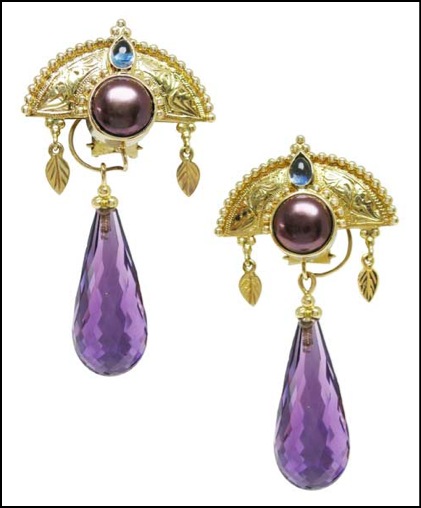Check out our Amethyst board on Pinterest for more photos and info!

These earrings by Paula Crevoshay feature teardrop shaped dangles of amethyst.
Amethyst
Quartz is found in abundance from every corner of the earth. In its purest form, quartz is colorless, but is most prized for its purple variety; amethyst. The color of this gemstone ranges from pale lilac to a deep royal purple. Purple has long been considered a royal color, so it is not surprising that amethyst has been so much in demand throughout history. Fine amethysts were favored by Egyptian royalty, are featured in the British Crown Jewels, and were a favorite of Catherine the Great.
The name Amethyst comes from Greek "Amethustos", meaning “not drunken”. Ancient Greeks and Romans wore amethyst and made drinking vessels of it in the belief that it would prevent intoxication. Medieval European soldiers wore amethyst amulets as protection in battle – the reason for this being that amethysts are believed to heal people and keep them cool-headed. Beads of amethyst were found in Anglo-Saxon graves in England.
Amethyst is the traditional birthstone for the month of February. It is available in small and large sizes, although as with all gemstones, very large sizes in rich, deep colors have always been rare. Designers celebrate amethyst as the ideal choice for jewelry because of its regal color, variety of sizes and shapes, affordability and wide tonal range from light to dark purple. Brazil is the primary source of amethyst, and Zambia is a significant source as well.
----------
In addition to the above information from the AGTA and other sources, you can find facts about these of gems and more at the "Gems and Gem Materials" online course, through the University of California-Berkeley's Department of Earth and Planetary Science. The website is available for the general public, and contains a wealth of information for the budding gemologist and anyone interested in learning more about gemstones. Hanna Cook-Wallace has contributed to this site, which was developed by Jill Banfield while teaching at the University of Wisconsin.